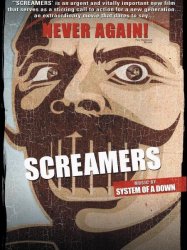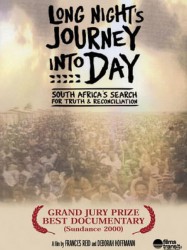Lumo est un film
Lumo (2006)

Si vous aimez ce film, faites-le savoir !
- Infos
- Casting
- Infos techniques
- Photos
- Vidéos
- Passages TV
- Citations
- Personnages
- Musique
- Récompenses
Durée 1h12
Lumo is a 2007 documentary film about twenty-year-old Lumo Sinai, a woman who fell victim to "Africa's First World War." While returning home one day, Lumo and another woman were gang-raped by a group of soldiers fighting for control of the Democratic Republic of the Congo during the 1994 Rwandan genocide. As a result, Lumo suffered from a traumatic fistula, a chronic condition that leaves her unable to bear children. Rejected by her fiance and most of the village, Lumo examines a woman's tragedy and the process of healing.
Lumo was directed and produced by Bent-Jorgen Perlmutt, Nelson Walker III, Louis Abelman and Lynn True and was aired as part of PBS's Point of View series in 2007.
Commentaires
Postez un commentaire :
Suggestions de films similaires à Lumo
Il y a 11441 films qui ont les mêmes thèmes (dont 16 films qui ont les mêmes 9 thèmes que Lumo), pour avoir au final 70 suggestions de films similaires.Si vous avez aimé Lumo, vous aimerez sûrement les films similaires suivants :

Flower in the Gun Barrel (2008)
Origine Etats-Unis
Genres Documentaire
Thèmes Afrique post-coloniale, Le racisme, Documentaire sur la discrimination, Documentaire sur le droit, Documentaire sur la guerre, Documentaire historique, Documentaire sur une personnalité, Documentaire sur la politique, Politique
Note80%





To a large extent, the film consists of interviews with genocide survivors, many of whom were children in 1994. In all, over thirty survivors, perpetrators, and experts were interviewed for the film. In these interviews, the survivors discuss what it means to be a Rwandan and to live next door to people who killed their families. The survivors describe how they deal with their country's request that they forgive one another and move on, so that Rwanda can rebuild and unify itself. Perpetrators' views illuminate the madness that seized the culture in 1994; exploring the experience of apologizing to victims, and examining what it is like to be looked at as a murderer in Rwandan society.

Rwanda pour mémoire (2003)
, 1h8Réalisé par Samba Félix Ndiaye
Origine France
Genres Documentaire
Thèmes Afrique post-coloniale, Film sur un écrivain, Le racisme, Documentaire sur la discrimination, Documentaire sur le droit, Documentaire sur la guerre, Documentaire historique, Documentaire sur une personnalité, Documentaire sur la politique, Politique
Entre avril et juillet 1994, le massacre Tutsis et des Hutus modérés a fait un million de morts. À l’initiative de Fest’Africa, une dizaine d’auteurs africains se sont retrouvés en résidence d’écriture à Kigali, quatre ans après les évènements, cherchant à briser le silence des intellectuels africains sur le génocide.
 , 1h20
, 1h20Réalisé par Roger Spottiswoode
Origine Etats-Unis
Genres Documentaire
Thèmes Afrique post-coloniale, Le racisme, Religion, Le terrorisme, Documentaire sur la discrimination, Documentaire sur le droit, Documentaire sur la guerre, Documentaire historique, Documentaire sur une personnalité, Documentaire sur la politique, Documentaire sur la religion, Politique, Religion juive
Note71%





 , 54minutes
, 54minutesRéalisé par Anne Aghion
Thèmes Afrique post-coloniale, Le racisme, Documentaire sur la discrimination, Documentaire sur le droit, Documentaire sur la guerre, Documentaire historique, Documentaire sur une personnalité, Documentaire sur la politique, Politique
Note70%





Set in Rwanda, Anne Aghion, the director, interviews a genocide offender who has been released back into his community, and the victims of the genocide. The film follows how at first, the coexistence between the people who instigated the genocide and the victimized people is unbearable. Many of the victims feel rage toward their former oppressors. But gradually, the victims and oppressors start talking to the camera, and then to each other as they start the difficult task of living with each other. The documentary portrays how the people's spirits cannot be crushed by the Rwandan Genocide, the 1994 mass killing of hundreds of thousands of Rwanda's minority Tutsis and the moderates of its Hutu majority by the Interahamwe and the Impuzamugambi.

Sweet Dreams (2012)
, 1h26Réalisé par Lisa Fruchtman
Origine Etats-Unis
Genres Drame, Documentaire, Historique, Musical
Thèmes Afrique post-coloniale, La musique, Le racisme, Documentaire sur la discrimination, Documentaire sur le droit, Documentaire sur la guerre, Documentaire historique, Documentaire sur la musique, Documentaire sur une personnalité, Documentaire sur la politique, Musique, Politique
Note76%






L'Afrique en morceaux (2000)
, 1h44Origine France
Genres Documentaire
Thèmes Afrique post-coloniale, Le racisme, Documentaire sur la discrimination, Documentaire sur le droit, Documentaire sur la guerre, Documentaire historique, Documentaire sur une personnalité, Documentaire sur la politique, Politique
Avril 1994 : génocide au Rwanda. 800 000 morts. Une catastrophe qui entraînera des déséquilibres dans toute la région. L’Afrique des Grands Lacs finit le siècle dans un bain de sang. Ce documentaire montre les intrigues, les coups d’éclat, les trahisons, les vengeances qui ont prévalu durant ces années avec pour seuls objectifs de conserver ou d’agrandir sa zone d’influence. C’est ainsi que cette décennie a vu s’envoler peu à peu tous les espoirs des populations. Espoirs d’une Afrique maîtresse de son destin, d’une autosuffisance alimentaire, de l’arrêt des conflits interethniques…

Umurage (2002)
, 52minutesOrigine Espagne
Genres Documentaire
Thèmes Afrique post-coloniale, Le racisme, Documentaire sur la discrimination, Documentaire sur le droit, Documentaire sur la guerre, Documentaire historique, Documentaire sur une personnalité, Documentaire sur la politique, Politique
Au Rwanda, une centaine de membres de l’association Ukuri Kuganze, essentiellement formée de survivants du génocide, et quelques-uns de leurs bourreaux, libérés après d’être confessés et avoir demandé pardon en 2003, se réunissent dans un centre de réinsertion. Ces bourreaux retournent chez eux, souvent dans les lieux mêmes où ils ont perpétré leurs crimes et ils doivent « faire face » à leurs victimes et leur demander pardon. En 1994, en l’espace de 100 jours, près d’un million de personnes avaient été assassinées, soit près de 10 000 morts chaque jour.

The Notebooks of Memory (2008)
, 53minutesRéalisé par Anne Aghion
Origine France
Thèmes Afrique post-coloniale, Le racisme, Documentaire sur la discrimination, Documentaire sur le droit, Documentaire sur la guerre, Documentaire historique, Documentaire sur une personnalité, Documentaire sur la politique, Politique
Anne Aghion's third film in her Rwanda series concentrates on the local citizen-judges' tribunals, where they must weigh survivor accounts of the genocide massacres against the perpetrators' testimony.

Screamers (2006)
, 1h29Origine Etats-Unis
Genres Documentaire
Thèmes Afrique post-coloniale, Le racisme, Documentaire sur la discrimination, Documentaire sur le droit, Documentaire sur la guerre, Documentaire historique, Documentaire sur une personnalité, Documentaire sur la politique, Politique
Acteurs Shavo Odadjian
Note58%





 , 1h34
, 1h34Origine Etats-Unis
Genres Documentaire
Thèmes Afrique post-coloniale, Le racisme, Documentaire sur la discrimination, Documentaire sur le droit, Documentaire sur la guerre, Documentaire historique, Documentaire sur une personnalité, Documentaire sur la politique, Politique
Acteurs Helen Mirren
Note75%





 Connexion
Connexion